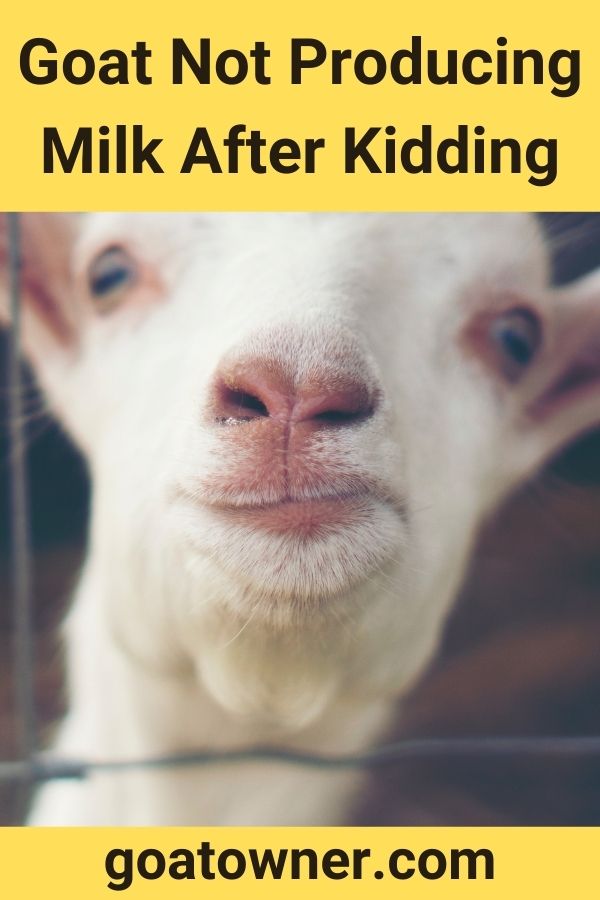Milking goats can be one of the most rewarding vocations in life.
Especially when they are your goats and you milk them purely for your own use, it is like subsisting off your own labor—what can feel better than that?
There’s nothing more disappointing, then, than a goat not producing milk after you have been through the process of kidding.
There are many reasons this can happen, and there are many things you can do to set it right.
Let’s look at some of the most common causes of your goat not producing milk after kidding, and what you can do to help.
Premature birth
It’s important that you take careful note of the development of your goat’s pregnancy.
You need to know what to expect and when, in order to know that everything is going smoothly.
One of the most common reasons that your goat is not producing milk after kidding is that they gave birth prematurely.
If your goat gave birth earlier than the typical 146-to-155-day gestation period, then they can very often not start milking for another couple of weeks after the birth.
You should start to notice milk production increase after 2-3 weeks.
The goats age could be a reason
Another common cause is the goat’s age.
Whether too old or too young, both can lead to poor or total lack of milk production after kidding.
Does can get pregnant from quite an early age, and it varies a lot between individuals.
If your goat gets pregnant too early, it may still not be able to produce milk.
Generally, does are able to be milked until they’re around 10 years old.
If your doe is approaching this age and is not producing milk, it may simply be a question of age.
You should stop breeding your goat at this point.
Nutrient deficiency
Since the milk is meant as nutrition for the kids, it will not surprise you to learn that the goat will have trouble producing nutrition if she has none herself.
This is one of the most common reasons goats do not produce milk after kidding.
The goat needs energy to produce the milk, and it won’t have enough if there are nutritional or even hormonal imbalances.
Whether the doe is too thin or indeed too fat, this can cause lack of milk production. think about switching up your goat’s diet—more grain is often a good way to help your goat gain weight quickly.
What your goat’s diet should be will depend on their breed and age.
Again, you’re going to need to keep an eye on them for the duration of the pregnancy as they’re going to need even more food while pregnant.
Infection
There are many parasites and diseases that can affect milk production in goats.
Goats are prone to worms, mites, lice, and other intestinal and digestive infections that can cause nutrient deficiencies.
They can cause tumors, encephalitis, mastitis, milk fever-any number of illnesses and problems which can lead to poor milk production.
The main issue is typically intestinal worms.
These eat the food the goat eats, stealing the nutrients from it.
This leads to malnutrition, and in turn poor milk production.
Underdeveloped udder
One final issue which very commonly affects does is that their udder does not develop properly during their adolescence.
Many physical and bodily dysfunctions can cause this, and naturally, this impedes their ability to produce milk.
If the teats are too small to be milked, then you’re going to have trouble getting milk from them even after kidding.
They will also have trouble feeding their kids.
Naturally, there’s not much to be done about this once the goat has finished maturing.
If the teats are underdeveloped, you won’t be able to milk the goat.
How to help
Always your first port of call should be a vet.
Many of the problems we have looked at above are very hard to diagnose without professional help, and will spiral out of control if not addressed as early as possible.
Though you might want to avoid the bills, the vet is your best bet at fixing the problem early.
That said, you’ve also got to think about your goat’s health as a whole.
If there’s a problem in any area, it could well lead to issues with milk production.
Keeping a close eye on their diet, as well as directly examining them for any signs of health problems, is your best shot at avoiding this issue.
Preventing the issue from occurring in the first place should not be difficult if you are keeping a proper eye on your goat’s health, and consulting a vet at the earliest signs of any issue.
Whether it’s their diet or some kind of infection, you can sort it out smoothly if you get it done as soon as you notice the signs.
There are many reasons your goat may have trouble producing milk, then.
Often, it can be difficult to diagnose the problem yourself.
The most important piece of advice you should always remember is that the vet is your best hope.
They will be able to accurately diagnose and properly treat the issue.
That said, there are many common things you should consider as reasons for the lack of milk production.
Your goat may just not be cut out for milking, and you might need to retire those wishes for now.
Ultimately, the goat’s health should always be your number one priority.
This is the only way you’re going to get a healthy, milking goat.

